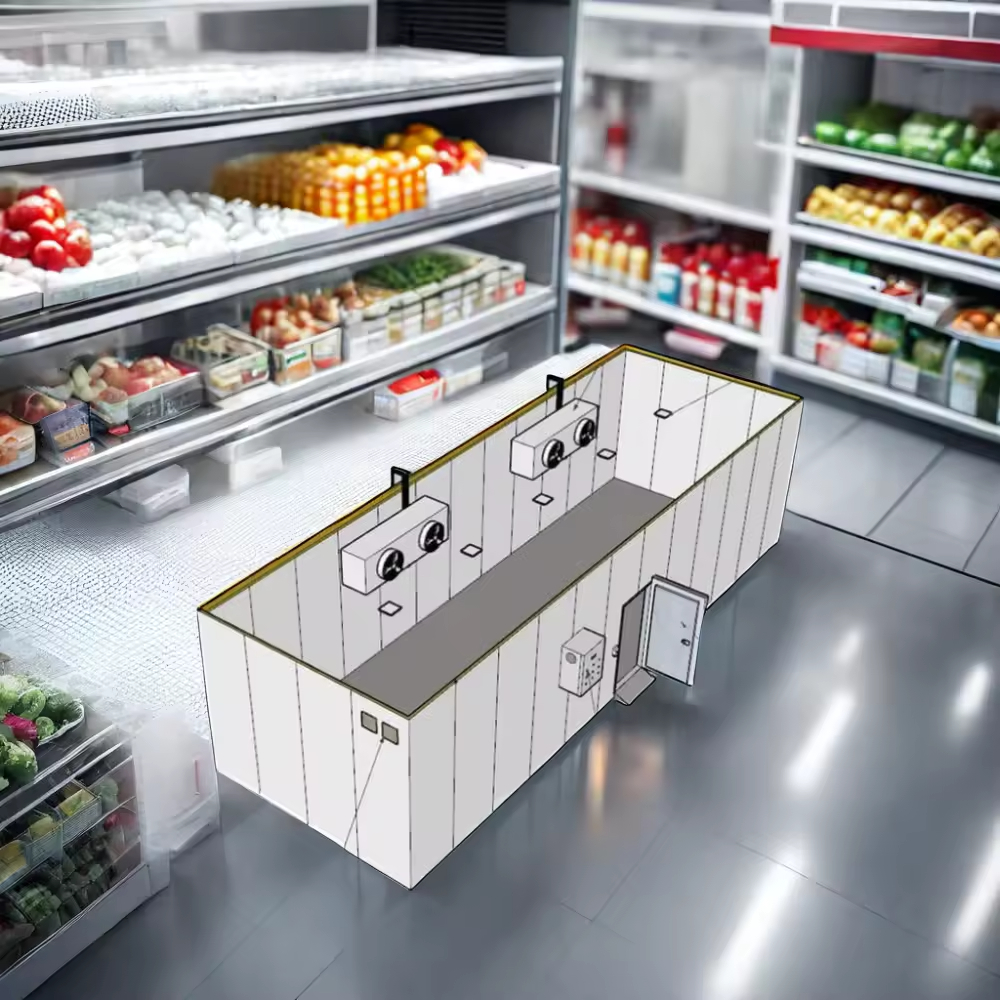How do different cores of cold storage panels compare

Whether it is used to store perishable foods, medicines or sensitive industrial processes, the choice of insulation board is crucial when building efficient, reliable and durable cold storage facilities. Among them, insulation material is the key among the keys. How do we make a choice when facing cold storage boards with different core materials? And from what aspects do we determine the core material of the cold storage panels we need?
When choosing the core material of cold storage panels, we need to choose from energy efficiency, temperature stability, structural integrity, fire safety, and moisture resistance. Today we analyze three types of cold storage panels: polyurethane/ Polyisocyanurate (PU/PIR), expanded polystyrene (EPS), and rock wool.
PU/PIR Cold storage panel
PU/PIR cold storage panel is a cold room panel commonly used for its excellent thermal insulation performance. Let’s take a look at its properties and advantages.
Composition & Structure: Rigid foam formed by reacting polyols and isocyanates. PIR is a modified, higher-performance variant of PU, offering slightly better thermal performance and fire resistance. Both create a closed-cell structure.
Thermal insulation performance (R value): Usually the R value is between R-6.0 and R-8.0 per inch (or the U value is between 0.020-0.023 W/m·K). This excellent thermal insulation performance minimizes heat intrusion, greatly reduces refrigeration energy consumption and maintains precise temperature.
Structural strength: In general, we use metal panels with extremely strong strength and rigidity to bond with core materials. Through the strong bonding of the machine, the PU/PIR cold room panel has a solid structure, a larger span, and stronger impact resistance.
Moisture resistance: The closed-cell structure of PU/PIR cold storage panel effectively blocks water vapor penetration, preventing moisture intrusion that can reduce thermal insulation and cause corrosion.
Fire Performance: PU cold storage panel is generally classified as Class B2 . PIR cold storage panel have excellent fire resistance, generally up to Class B1, with higher resistance to flame spread and lower smoke generation due to the formation of more stable carbon char in fire.
EPS cold room panel
EPS cold room panel is the lowest cost among cold room panel products and is the best choice for cold rooms with low requirements. For example, short-term storage, medium-temperature refrigerators (such as +2°C to +8°C), temporary buildings, or applications where budget constraints are crucial and energy efficiency is secondary.
Composition and structure: EPS core material is made of expanded polystyrene beads melted under high temperature and pressure. Its main component is a closed-cell structure, but it is more open than polyurethane/polystyrene (PU/PIR).
Thermal insulation performance (R value): R value is usually about R-3.8 to R-4.4 per inch (U value is about 0.035-0.040 W/m·K). The thermal insulation efficiency is significantly lower than PU/PIR, so thicker boards are required to achieve equivalent performance.
Structural strength: Mainly depends on density. The density of general EPS is between 10-20 kg/m³, and low-density EPS cold room panels are more easily broken or damaged during handling and installation. The adhesion to the finish is generally good, but its inherent strength is not as good as PU/PIR cold storage panel.
Moisture resistance: Although the core material is a closed-cell structure, the bead structure provides a potential channel for the penetration of water vapor over time, especially when damaged. Compared with PU/PIR cold storage panel, it has poor moisture resistance. Long-term exposure to a humid environment will reduce the R value and also reduce the thermal insulation performance.
Fire performance: Usually B3 grade, it can reach B2 grade after adding flame retardants. It is flammable, melts and drips, and produces a lot of smoke. During use, more fire protection measures need to be added.
Rock Wool Cold Room panel
The biggest advantage of Rock Wool Cold Room panel is its excellent fire resistance, which can last up to 2 hours or even longer. It is mainly used in places where fire safety is critical and thermal efficiency and moisture resistance are more important. For example, cold rooms adjacent to high-risk areas, key escape routes, or where strict non-combustible building codes apply.
Composition and structure: Made of molten rock or slag spun into fibers and bonded. Forming a dense, loose fiber mat.
Thermal insulation performance (R value): Usually the R value is 3.7 to 4.2 per inch (U value is about 0.035-0.040 W/m·K). Similar to EPS, but thicker boards are required to achieve the same thermal insulation performance.
Structural strength: The fiber properties have little effect on the structural strength; the strength of the board depends mainly on the density of the panel and core material. The core material density is 40-140kg/m3, and if it is not properly supported or the density is not enough, it is easy to sink over time. For Rock Wool cold storage panels that require higher strength, a higher density needs to be selected.
Moisture resistance: The loose fiber structure easily absorbs moisture and water vapor. This greatly reduces its thermal insulation performance and may cause corrosion of panels and structural elements. Therefore, an extremely strong moisture barrier is required on both sides. This increases costs.
Fire resistance: Non-combustible (Grade A/European Grade A1). Fire resistance period of 2 hours or even longer. Not only does it not contribute to the spread of fire, but it also provides excellent fire separation.
Conclusion:
From the above, we know that for the most critical core insulation requirement of cold storage panels, PU/PIR cold storage panels are the best choice for most applications. They have thermal efficiency, structural integrity, moisture resistance and good fire resistance (especially PIR cold storage panel. The significant energy saving effect makes its higher initial cost reasonable. EPS cold storage panels are cold storage panels with low requirements and are used because of their low cost. Rock wool cold storage panels are rarely used in normal cold storage panels, and are only selected for applications with special fire protection requirements due to their excellent fire resistance.
